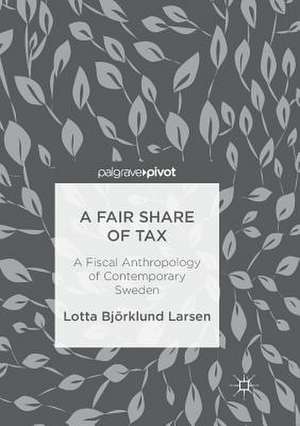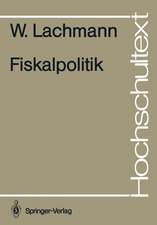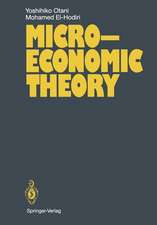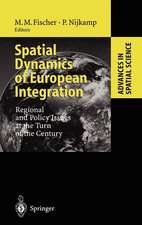A Fair Share of Tax: A Fiscal Anthropology of Contemporary Sweden
Autor Lotta Björklund Larsenen Limba Engleză Paperback – 4 iun 2019
This book is open access under a CC BY 4.0 license.
This book takes a taxpayer's perspective on the relations taxation creates between people and their state. Björklund Larsen proposes that in order to understand tax compliance and cheating, we have to look beyond law, psychological experiments and surveys to also include tax collectors and taxpayers' practices. The text explores the view of taxes seen as citizen’s explicit economic relation to the state and implicit economic relation to all other compatriots. Björklund Larsen directs our gaze onto the concept of reciprocity, which is often proposed as an explanation in tax compliance research, and explores its diverse meanings and implications ethnographically.
The empirical cases are based on ethnography from two opposing tax practices in Sweden. Firstly, from a study of analysts, auditors, legal experts and managers at the Swedish Tax Agency and how they, quite successfully, strive for legitimacy in their tax collecting activities. Secondly, from fieldwork among a group of middle-aged Swedes and how they justify their purchasing work off the books – essentially tax-cheating practices. Sweden is a modern welfare society with citizens holding rational and secular values, yet trusting their government and fellow citizens. Sweden also has a high tax burden that is collected by one of its most revered governmental agencies – the Swedish Tax Agency - making it an interesting case studying tax compliance.
| Toate formatele și edițiile | Preț | Express |
|---|---|---|
| Paperback (1) | 213.97 lei 6-8 săpt. | |
| Springer International Publishing – 4 iun 2019 | 213.97 lei 6-8 săpt. | |
| Hardback (1) | 220.13 lei 6-8 săpt. | |
| Springer International Publishing – 31 ian 2018 | 220.13 lei 6-8 săpt. |
Preț: 213.97 lei
Nou
Puncte Express: 321
Preț estimativ în valută:
40.95€ • 42.51$ • 34.14£
40.95€ • 42.51$ • 34.14£
Carte tipărită la comandă
Livrare economică 25 martie-08 aprilie
Preluare comenzi: 021 569.72.76
Specificații
ISBN-13: 9783319888408
ISBN-10: 3319888404
Pagini: 136
Ilustrații: XIII, 136 p.
Dimensiuni: 148 x 210 mm
Greutate: 0.19 kg
Ediția:Softcover reprint of the original 1st ed. 2018
Editura: Springer International Publishing
Colecția Palgrave Macmillan
Locul publicării:Cham, Switzerland
ISBN-10: 3319888404
Pagini: 136
Ilustrații: XIII, 136 p.
Dimensiuni: 148 x 210 mm
Greutate: 0.19 kg
Ediția:Softcover reprint of the original 1st ed. 2018
Editura: Springer International Publishing
Colecția Palgrave Macmillan
Locul publicării:Cham, Switzerland
Cuprins
Chapter 1: Exchanges create relations.- Chapter 2: Taxpayers’ relation to their state.- Chapter 3: Taxpayer to taxpayer relation.- Chapter 4: Tensions between Paying and Receiving.- Chapter 5: Making tax compliant.
Recenzii
“The monograph provides thorough insight into the practises of the Swedish Tax Agency and the considerations of taxpayers when deciding whether or not to be tax compliant. Due to the topical nature of the matter at hand it should be of interest to a broader audience.” (Yvette Lind, British Tax Review, Issue 2, 2021)
Notă biografică
Lotta Björklund Larsen is Research Fellow at Linköping University, Sweden. She is an economic anthropologist that finds taxation a fascinating practice as it goes right to the heart of the relations between individuals’ values, governmental regulations and institutional impact. She has been a visiting scholar at the University of California, Irvine and The City University of New York, USA. Prior to academic work, Björklund Larsen worked in the financial software industry.
Textul de pe ultima copertă
This book is open access under a CC BY 4.0 license.
The empirical cases are based on ethnography from two opposing tax practices in Sweden. Firstly, from a study of analysts, auditors, legal experts and managers at the Swedish Tax Agency and how they, quite successfully, strive for legitimacy in their tax collecting activities in society. Secondly, from fieldwork among a group of middle-aged Swedes and how they justify their tax-cheating when purchasing work off the books. Sweden is a modern society seen as particularly rational and the least prone to worry about survival issues; they trust their government and fellow citizens. Sweden is therefore an important country to look at as an example of tax compliance and whether other countries showing a continuous inclination towards these values will follow their lead.
Caracteristici
A fresh and necessary outlook at tax compliance issues from an economic anthropology perspective Stresses reciprocity is to be taken seriously in tax compliance Explains reciprocal relations based on what taxpayers and tax practitioners actually do














